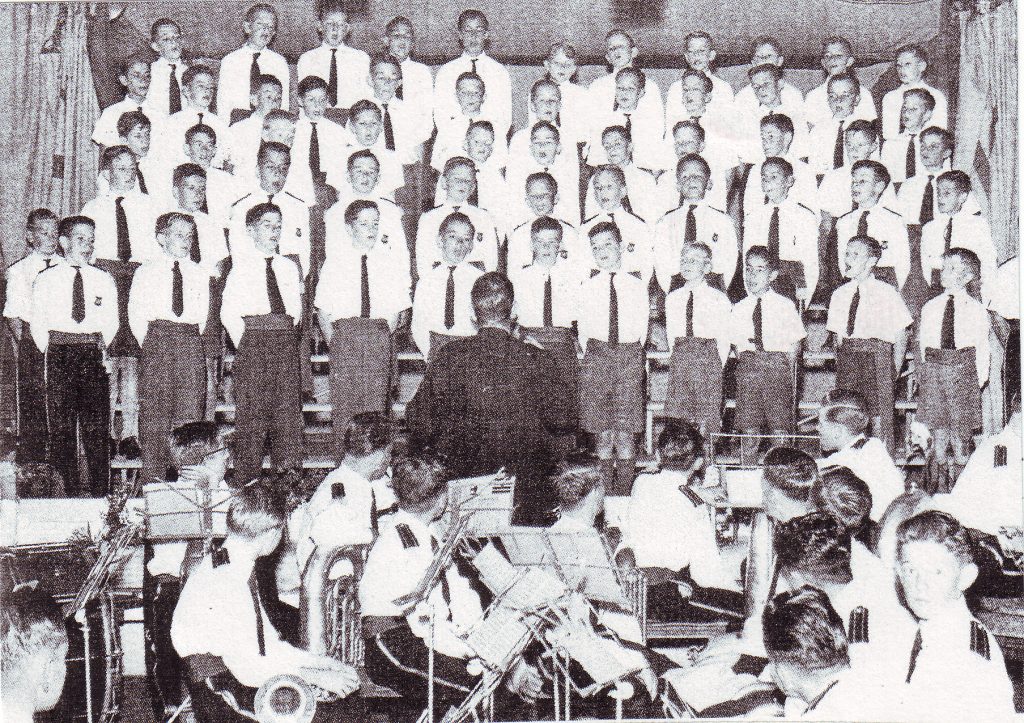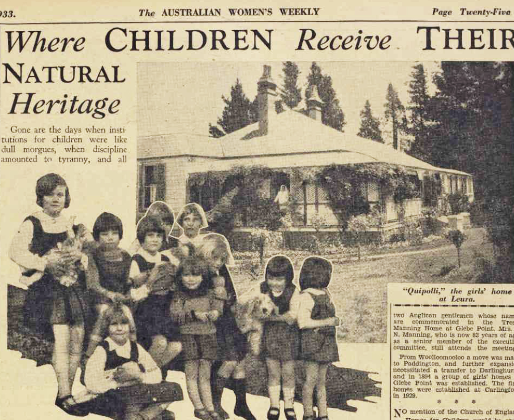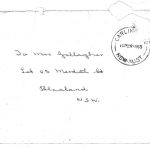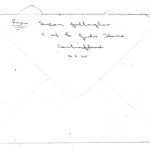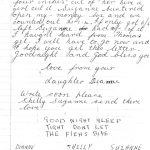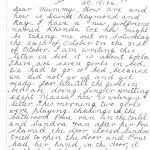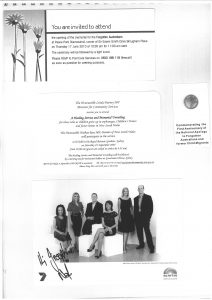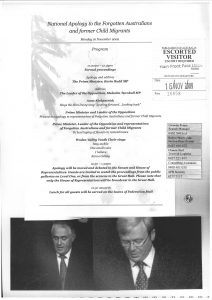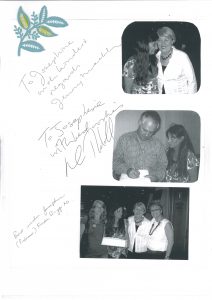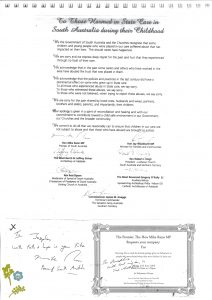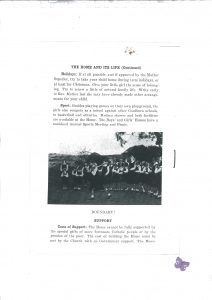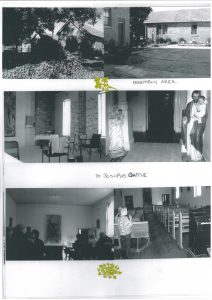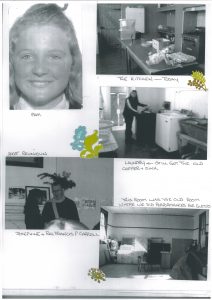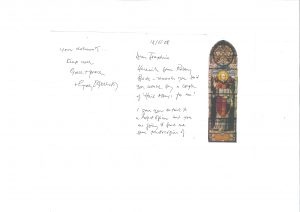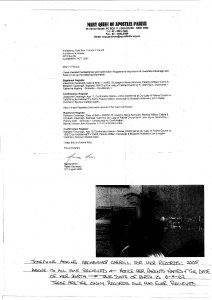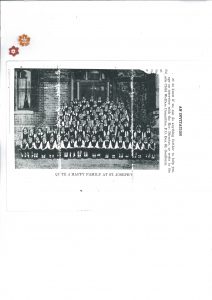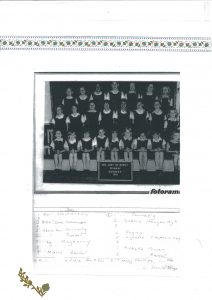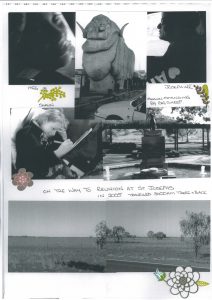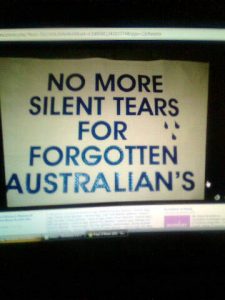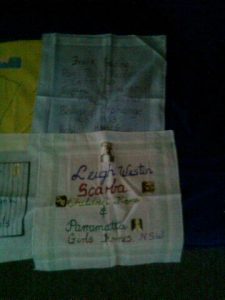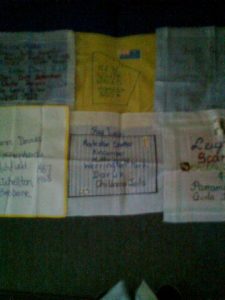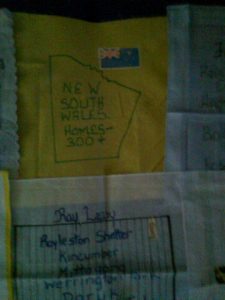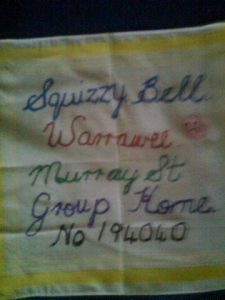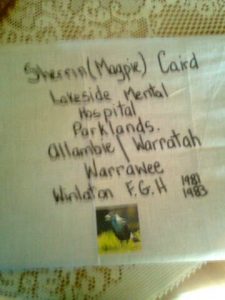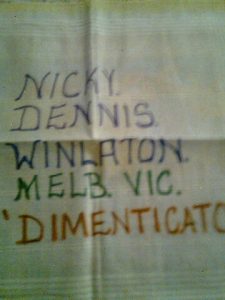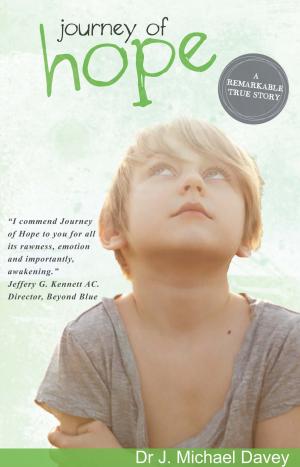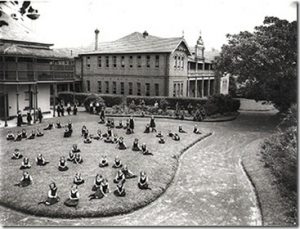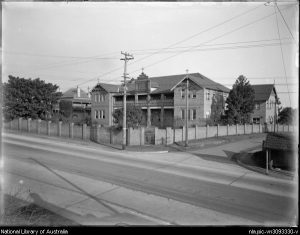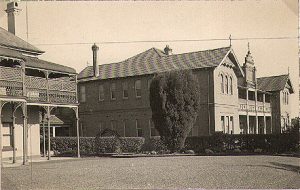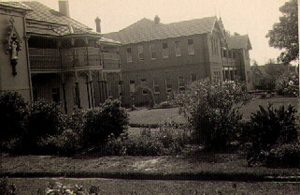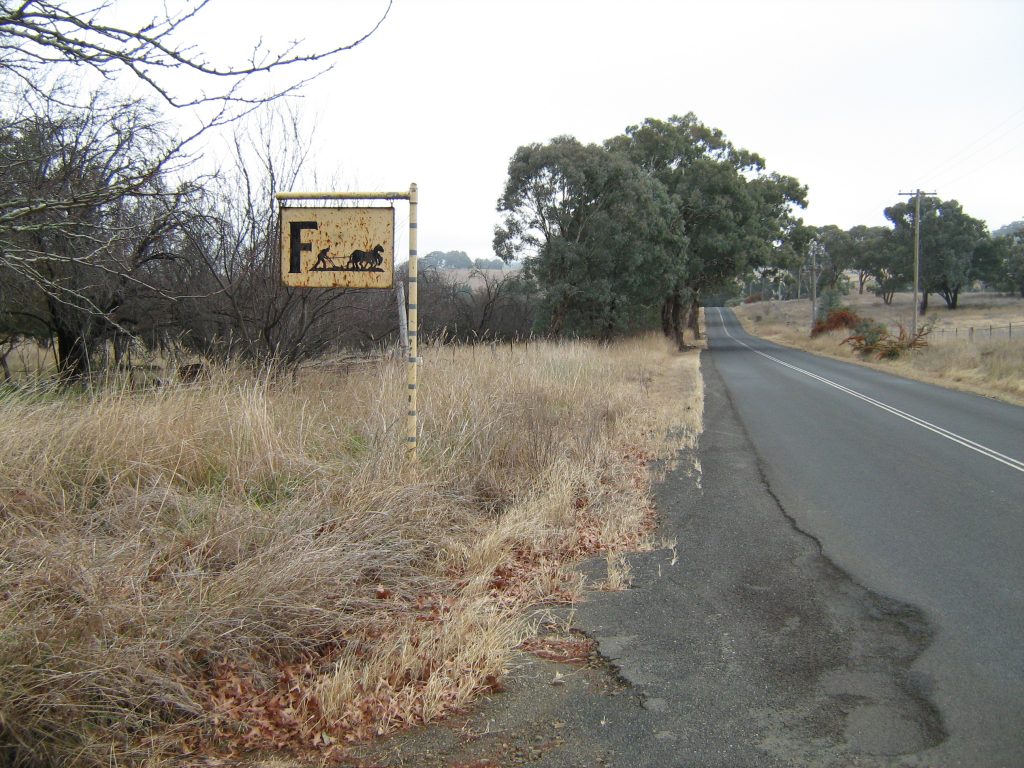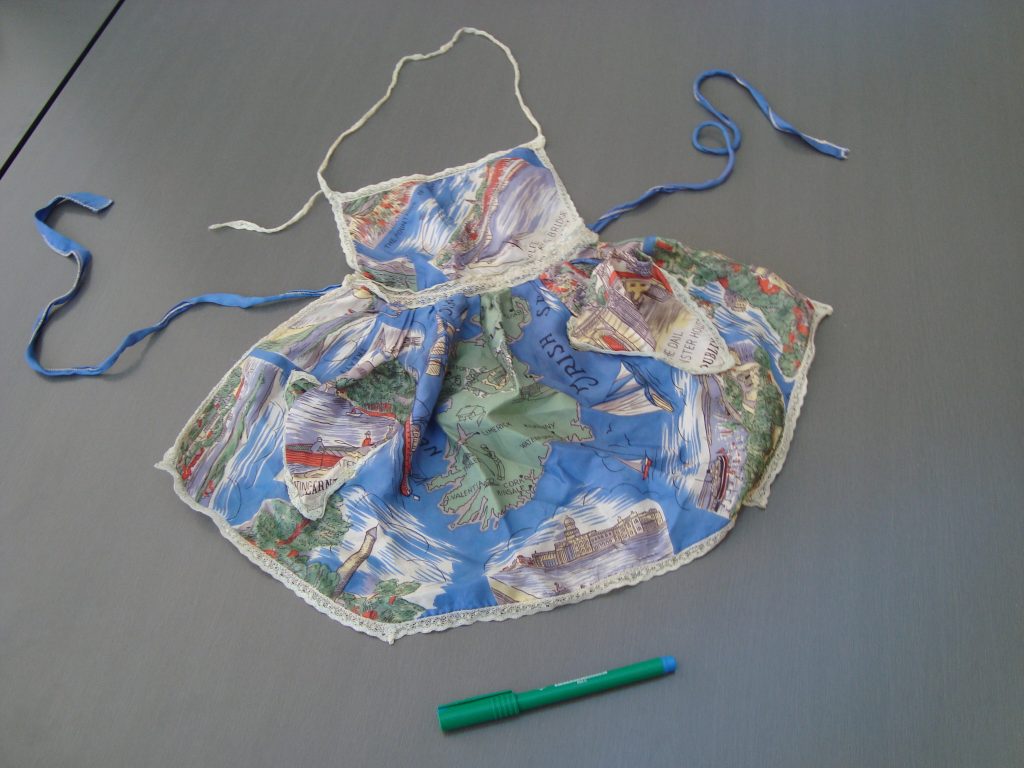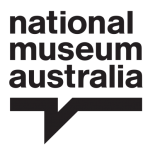by Diane Mancuso (guest author) on 4 October, 2011
‘These are my observations, thoughts & feelings’, writes Diane Mancuso. Many Forgotten Australians bear the burden of memories associated with institutional ‘care’. In this series of poems entitled DOCS (Department of Children’s Services), Diane courageously demonstrates the intergenerational risk of children being lost to out-of-home care. The cycle sadly continues.
DOCS-department – ‘we keep families together’
Deluded I thought that things had changed since I was a child
Ethan
Hebrew – firm, strong long lived
First of November, a son is born
Five years of regret, five years of searching my heart,
Not a moment ticks without feeling torn
Questioning my thoughts, my regrets, and my body wracked with pain
1825 days, seconds, minutes spent apart
When I think I cannot go another day
I close my eyes hoping it will be the last time!
I am never granted this prayer
I did not hurt my child for this – evil is a crime!
Ridiculed —society thinking we didn’t care
I am forced to confront another tomorrow
For five years, we walked with our heads low feeling the shame
My body aches pulsating with so much sorrow
Our fault yes! Naeviety was not even considered I was to blame
DOCS-Department of Community Service Mission Statement
‘We keep families together’
Opening the door with my little son nestled upon my shoulder
Accusations, fingers pointed, voices raised, I only heard two words ‘son hurt’
No chance, to explain certain of our guilt their minds already made up
Six weeks old words of abuse, I did not understand! My tiny son ripped from my embrace forever
Not given even an opportunity to kiss his downy hair, or touch his hand
Moments so painful, never to forget, imprinted images to remember every day –
Means to want to die
Snapshots of pure joy, celebration of his birth, joyous moments in time. That I would come to bring out tracing his face, his first smile, trying to smell his baby scent.
I repeated over & over
But they had already decided I was guilty
I did not see anything nothing I would cry
Over five years the pain was always behind my mask, long days when I sobbed & sobbed till I was spent
My baby gone, my man gone, I felt so alone, desolate only the walls to echo my screams of surrender, pleading to be free from this wretched pain that imprisoned me-to be gone
I was devoid of any feelings numb, a phone call to whisper what I needed
I lay down as he injected us both, I welcomed darkness
I died that night!
He screamed for me, shook me, but I was gone, no more pain no suffering
Ambulance came ‘flatlined’ they said but they did their job I cursed why?? Did they not let me be!?! Leave me be!
Where there was no light!!!
Five years of torment, anguish enveloped in so much pain, a part of me was gone -for ever
My decision not to see him, was not about me, to let him have a better life without disruptions was the only gift I could give him
In exclusion we lived, in fear of my memories, rejection being the norm, we held on together
Five years, have gone past, I yearned to be a mum, another chance to prove them wrong
I do not understand why I stayed with this man of destruction, manipulation, deciet, I cannot answer!
Nor do I know why I did not see!!!
I can only guess that through the years he slowly destroyed any self worth, doubting my every word or thought that I would speak.
He was a master of insencerity a genuine phycopath, I was blind everyone but me could see what he was doing behind the mask he wore.
Too trusting, nieve, or if I was to believe in what everyone said then what did that make me???
Again, I believed him
I thought I saw changes or maybe I just wanted to believe that he had been wrongly accused
After, so long I yearned to be a mother I craved approval I wanted to be the mother I knew in my heart I could be
I was not aware I had to have permission from DOCS-department to be a mum again but I was very wrong!!!!
If only I could turn the clock back I would have put him first not last, but no one can know what a tragedy my decision would be
If only, If only,
Aleayah
The greatest gift from god
That’s the meaning of Aleayah
My daughter waited 5 years then another 9 months to be able to meet the most precious, wanted little baby girl
From the most joyous moment of pure elation to welcome this wide eyed, scrap of such innocence & pure of heart little angel into our embrace
Fresh from the wonderment of her entrance to the delivery into gentle meek, hands of her mother
To be nestled against mother’s breast.
Her baby pink, rosy, skin moist, flushed,
Warm from the cocoon of her mother’s womb
The first hesitant gentle tender touch, that flutters & settles within my heart images of satin, rose petals, a tear drop caught before it stains her cheek.
The dizzyingly euthoria to be able to greet this cherished treasure to know the complete dependency upon our care the complete trust to keep her safe, secure, loved & all the little moments that we will treasure, & guard in our own box of memories to keep & laugh with her when she is old enough to share.
To protect her, cuddle her, sing her lullubys,
Watch her 1st step her 1st words, her giggle,
Her skinned knees that a kiss will make it better
All the years to tell her stories, to wipe away any tears,
To allow her to be just her
To let her run with the wind at her back
To embrace her when she hurts
To allow her to make her mistakes
To be there to pick up the pieces
To listen & not judge, praise her, cherish her
We adorned her room with pink, frills, a room for a princess, a theme of angels, & little girl trinkets
We wove a tapestry of love,
A testimony of our devotion of simplicity, warmth, to protect our most precious treasure.
Visions, dreams, hopes, promise, faith, shattered damaged, destroyed, ruined, hearts completely broken
Not 2 hours old they came with their ID’s, security, their legal paper work vocalizing their prepared speeches!!
DOCS-department minister, care, emergency, foster, say goodbye
The house phone rings sobbing’ ‘Mummy, Mummy come back to the hospital their taking my daughter’
No I scream, oh god no!!!
I entered the entrance just as they were taking my grandaughter away
Stop, I say leave her with me??? I repeat let me take her?? ‘No I’m told you can not have her’ why why why????
Given contact details then they left with my precious grandchild!!!!!
I stood there numb, devestated, bewildered, no, no, – not again please god don’t do this!!!
I could only watch as they wheeled my tiny grandaughter away from me to an unknown stranger
I ran, ran, up stairs to my daughter who was so distressed she could not speak, sobbing ‘Mum Mum just let me die now’
Feeling so helpless I sobbed with her rocking her in my arms
Her arms though were now empty!!!
My daughter the most gentle, kind, vulnerable, childlike lay inconsolable curled in a feotel position trembling with raw pain
When you are a mother & your child is suffering so badly & you can’t do anything
I wanted to take her pain but I knew I could not!
No matter how much I wanted to protect her
Visions of extreme murderous intent fluddered my mind
To inflict the same ravage pain I saw in my daughters eyes
To the people who did this to my child!!!
And so it came to be
To go home to a nursery decorated for a little angel
Close the door, close the door,
Oh if we could close the door to our pain!
Every day is a struggle the insane suffering never leaves, we battle on and on, for our little gift from god will come home
Not today, not tommorrow, but maybe, maybe next week
As the weeks turned into months my daughter, struggled with severe suicide thoughts, I was very afraid that I would lose her & my granddaughter.
She did everything she could to have her daughter returned to her, she seperated from the man who had made her life so unbearable, she took out an AVO, we went together to all the contacts to see her daughter, even though It became extremly distressing to see Aleayah bonding with her carers.
We went to every court date only to be rebuffed each time by docs. She sought therapy & goes each week, she supplied DOCS with a drug test it was clear.
Now the nursery sits empty a cot with no Aleayah, toys untouched, musical ornaments to keep her entertained get dusty on the shelves.
If I have to go into her room, I rush in & out so quickly disturbing the dust moates & to avoid the sadness & the shadows in her empty room I run out slamming the door behind me as if this could keep the pain locked away.
Sometimes, I think I can hear her crying but it is only the night wind, for Aleayah is lost to us now my tears I hide my heart breaks for my beautiful blue eyed little tiny grandaughter.——–who I will never know
This is how DOCS keep families together …
Last entry ——-I was given an assessment to be able to raise Aleayah but it is so ironic I failed due to being bought up in care … poetic … justice … will it ever go away do I have this stigma for all of my life. It cost me my grandaughter & my childhood
Family we fought in the courts my ex-husband again paid out thousands to a barrister & lawyer but no amount of money could restore Aleayah to us.
DOCS refused to even give my family the opportunity to raise Aleayah with her biological family.
It also came to my attention that they knew my daughter was pregnant from 3 months. My question to them was ‘why did they not contact us to be able to give my daughter some options other than to react with such mallisious, insideous, so callerously remove, rip her away from my daughters breast?’
I would not wish this inhumane treatment dished out by DOCS -department
To any family god bless please keep her safe let the angels watch over her tonight & every night
Diane Mancuso.

